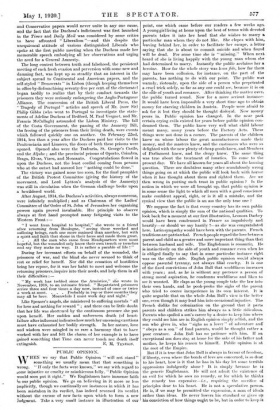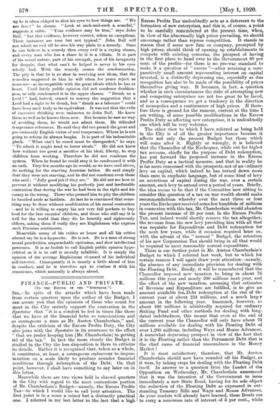PUBLIC OPINION.
WHEN we say that Public Opinion "will not stand" something we usually mean that that something is wrong. " If only the facts were known," we say with regard to some injustice or cruelty or mischievous folly, "Public Opinion would soon put it right." We Englishmen have immense faith in our public opinion. We go on believing in it more or less implicitly, though we continually see instances in which it has been mistaken in its verdict, has indeed reversed its verdict without the excuse of new facts upon which to form a new Judgment. Take a very small instance in illustration of our
point, one which came before our readers a few weeks ago, A young girl living at home upon the best of terms with devoted parents takes it into her head that she wishes to marry a particular man whom they do not like. She elopes with him, leaving behind her, in order to facilitate her escape, a letter saying that she is about to commit suicide and when found will be dead. For some time she is "missing." When next heard of she is living happily with the young man whom she had determined to marry. Instantly the public acclaims her a
heroine. How far the whole story was bona fide, how far there may have been collusion, for instance, on the part of the
parents, has nothing to do with our point. The public was warmly, riotously, upon the side of a person who perpetrated a cruel trick solely, so far as any one could see, because it is on
the side of youth and romance. After thinking the matter over. the public turned round. Now for a more scrim] instance- It would have been impossible a very short time ago to obtain money for starving children in Austria. People were afraid to ask for it lest they should be thought disloyal. Now money pours in. Public opinion has changed. In the near past certain crying evils existed for years before public opinion con- demned them. The public knew very well what child labour meant many, many years before the Factory Acts. These things were not done in a corner. The parents of the children knew on whose labour the great manufacturers made their money, and the masters knew, and the customers who were so delighted with the new plenty of cheap goods knew, and Members of Parliament knew, and the clergy knew. The same thing was true about the treatment of lunatics. To come to the present day. We have all known for years all about the housing question. There are doubtless many other scandalously wrong things going on at which the public will look back with horror when it has thought about them and righted them. Are we then wrong in putting such trust in public opinion ? Is the notion in which we were all brought up, that public °Onion in in some sense the light to which all men with a good conscience make confident appeal, right, or is it all a mistake, and the cynical view that the public is an ass the only true one ?
We suppose the fact is that every country has its own public opinion, which is simply the sum of the national qualities. To look back for a moment at our first illustration, Leonora Darbey would have been condemned in France as impulsively and heartily—or should we say hastily 1—as she was congratulated here. Latin sympathy would have been with the parents. French traditions are patriarchal. French people regard the love betwetn parent and child as a greater and more important thing than that between husband and wife. The Englishman is romantic. He is instinctively on the side of youth and romance even u hen he is obliged finally to say that in some particular instance right was on the other side. English public opinion woad always oppose parental tyranny, not always filial cruelty. It is one of the fixed convictions of John Bull that worldliness increases with years ; and, as he is without any pretence a person of strong moral aspiration, he condemns worldliness and likes to see it worsted. He claps as the young couple take the law into their own hands, and he pooh-poohs the sighs of the parent who tried to coerce inexperience in its own interest. It is quite arguable that on the whole John Bull's view is the better one, even though it may lead him into occasional injustice. The French dislike for colonization on the ground that it parts parents and children strikes him always as a little ridiculous. Parents who spoiled a son's career by a desire to keep him where they could see him are in English opinion simply selfish, and the son who gives in, who "sighs as a lover" of adventure and "obeys as a son" of fond parents, would be thought rather a poor creature. John Bull has no patience with him. If an exceptional son does stay at home for the sake of his father and mother, he keeps his reason to himself. Public opinion is at the root of the Empire.
But if it is true that John Bull is always in favour of freedom, if liberty, even where the bonds of love are concerned, is BO dear to his heart, how is it that he has in his day let some terrible oppressions indulgently alone ? It is simply because he is the generic Englishman. He will not admit the existence of an evil for which he sees no remedy, or for which he thinks the remedy too expensive—i.e., requiring the sacrifice of principles dear to his heart. He is not a speculative person. He is, if we may be permitted-the expression, a man of ideals rather than ideas. He never lowers his standard or gives up his conviction of how things ought to be, but in order to keep it
up he is often obliged to shut his eyes to how things are. "We are free ! " he shouts. "Look at such-and-such a scandal," suggests a critic. "Your evidence may be true," says John Bull, "but this evidence, however correct, refers to exceptions. These instances are true but not typical." John Bull will not admit an evil till he sees his way plain to a remedy. Once he can believe in a remedy then every evil is a crying shame, and every man who has a share in it is a villain. It is part of his moral nature, part of his strength, part of his incapacity for despair, that what can't be helped is never in his eyes wholly bad. With the remedy comes the condemnation. The pity is that he is so slow in receiving new ideas, that the remedies suggested to him he will often for years reject as nonsense—as incompatible with the great ideals which he has at heart. Until lately public opinion did not condemn druhken- ness, or only condemned it in the upper classes. "Drunk as a Lord ! " had, indeed, ceased to convey the suggestion that a Lord had a right to be drunk, but "drunk as a labourer" could have been used truly as its equivalent. It was not that the evils of excessive drinking were unknown to John Bull. He knew them as well as he knows them now. But because he saw no way of avoiding them, he would not admit them. He ridiculed temperance reformers. He said they did not preach the great and pre-eminently English virtue of real temperance. Where he is not going to reform he always laughs. It is part of his indomitable pluck. "What can't be cured must be disregarded," he says.
To admit it might tend to lower ideals." He did not know how -without too great a sacrifice of his ideal, liberty, to stop children from working. Therefore he did not condemn the system. When he found he could stop it he condemned it with an oath. Very few months ago he would, as we have said above, do nothing for the starving Austrian babies. He said simply that they were not starving, and he did not condemn even those who said : "Jolly good job if they ate." He did not see how to prevent it without modifying his perfectly just and irrefutable contention that during the war he had been in the right and his enemy in the wrong. Those who pressed him to pity the children he brushed aside as faddists. At last he is convinced that some- thing may be clone without modification of his moral contention —and he is willing to empty his not very full packets to buy food for the late enemies' children, and those who still say it is well for the world that they die he heartily and righteously abhors, asking them if really, they are Englishmen who express such Prussian sentiments.
Meanwhile many of his critics at home and all his critics abroad say he is a hypocrite. He is not. He is a man of strong moral proclivities, unquenchable optimism, and slow intellectual processes. It is as foolish to call English public opinion hypo- critical as it is to call it morally infallible. It is simply the opinion of the average Englishman cleansed of his individual self-interest. Consequently it is usually a little ahead of him in conduct, and he is therefore apt to confuse it with his conscience, whioh.naturally is always ahead.



































 Previous page
Previous page